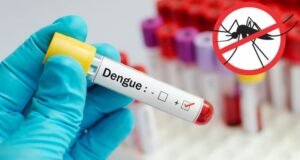
When I was in class nine, a friend of mine spoke to me about her irregular menstruation cycle; she lamented how her periods almost lasted a month. At the time, I couldn’t fully grasp the depths of her plight. I, with my textbook 28-day cycle, assumed such things were impossibilities, just another bizarre quirk of adolescence. It wasn’t until years later, when she mentioned she’d been diagnosed with Polycystic Ovary Syndrome (PCOS), that the pieces clicked into place.
It was not until I was in my 20s that I learnt about PCOS. I dove deep into the biology of it because I did not know why this was happening to so many women around me.
Polycystic Ovary Syndrome (PCOS) is one of the most common endocrine disorders affecting women of reproductive age. It is characterised by a combination of symptoms and can lead to both reproductive and non-reproductive health issues. Key features of PCOS include hyperandrogenism (elevated levels of male hormones), chronic anovulation (lack of ovulation), and polycystic ovaries visible through ultrasound. However, the exact definition of PCOS can vary due to its diverse presentation.
Anika Bushra, 27, who was diagnosed with PCOS in 2018, says, “I always had irregular periods. And PCOS is something you would not hear of often. I had this pen friend in Australia who first suggested that I get myself checked for PCOS, then from one of my cousins also had gotten tested for it and was officially diagnosed. However, my concerns were not really understood well by my parents, and I don’t blame them. I kept on badgering my family doctor for tests. It took me one and a half years to make an independent decision and get checked for PCOS.” This is a recurring issue for the women who have irregular menstruation cycles. Chalking it up to a system glitch or something that would fix itself often leads to dire consequences.
Long periods and cramping despite not having a period are common symptoms of PCOS. “I was diagnosed with PCOS in 2017 as an adolescent. But the symptoms appeared in 2015. At first, my periods were irregular, and when they did come, they lasted two to three months. I used to experience period cramps and headaches all year round. As a result, being physically weak and fatigued in everyday life was a given,” says Indrani Baral, 24, when speaking about the initial symptoms she experienced that led to her diagnosis.
PCOS is associated with significant health risks, including infertility, increased risk of diabetes, hypertension, cardiovascular diseases, and cancer. It can also impact the psychological well-being of women, particularly those dealing with hirsutism (excessive hair growth) and menstrual irregularities, which may lead to depression or anxiety.
The interviewees spoke about the lack of targeted therapy for women who are diagnosed with PCOS. They noted that doctors frequently prescribe menstrual control pills rather than investigating the reasons for PCOS.
“Most doctors I’ve consulted with have popped me with menstruation-regulatory pills and metformin. The adverse effects of metformin had negative impact on my mental health,” revealed Bushra. Metformin is an oral diabetes medication that decreases blood sugar levels by lowering glucose absorption and production.
The ignorance of healthcare professionals further adds insult to injury. Indrani was prescribed hormone pills to regulate her periods as well, she says, “I have not found the gynaecologists I have consulted supportive. They would recommend things like getting married and having children as soon as possible, as my first doctor advised in 2017. Parents of girls in our society are often concerned about the situation. But this isn’t the case. Having a child in this scenario is not the solution.”
Dr Shamima Aktar, gynaecology and obstetrics consultant at Prabin Hospital (BAAIGM), says, “I see younger girls with PCOS visiting me on a daily basis. Contrary to popular belief, PCOS does not solely affect obese people; I often see slender women seeking my medical attention. People with PCOS have a harder time regulating their hormones, and they require lifestyle changes to regulate their hormones. But each case is different, so they have to consult with their gynaecologists. Parents need to remain vigilant when their children are confiding in them with their issues. In my experience, targeted therapy is typically lacking because most parents are unaware of the issue.” She also draws attention to the stigma associated with the topic and how parental misinformation might exacerbate pre-existing medical conditions.
As a young person who has been diagnosed with PCOS, Anika suggests that anyone experiencing PCOS difficulties or who is unsure whether they have the condition speak with a specialist. She also advises them to do their own research and question doctors about the adverse effects of every medication they prescribe.
A few PCOS symptoms can be lessened by altering one’s lifestyle. A balanced diet and regular exercise can help lower body weight and lower the risk of type 2 diabetes. In addition to improving your life, diet, exercise, and other lifestyle practices like getting enough sleep and controlling stress can help manage PCOS symptoms and reduce the chance of developing chronic diseases.
In 2021, it was evident to Indrani that taking pills was not the only solution because PCOS cannot be cured completely. So, she consulted a different doctor.
“I’ve been advised to exercise or walk for at least one hour every day. I now eat more protein and veggies than carbohydrates on my plate. Sugary foods cannot be taken on an empty stomach. It is beneficial to consume less sugar. Chia seeds, pumpkin seeds, roughage-type meals, and spearmint tea are quite beneficial. The doctor informed me that women with PCOS have a higher risk of developing type 2 diabetes and breast cancer due to insulin resistance and poor metabolism,” states Indrani.
Since stress hormones are also important in this context, she emphasises stress management. She mentioned that girls with PCOS need to get a good amount of sleep. “Our bodies require a little bit more attention than others, so we must strive to be gentle with them. To deal with day-to-day PCOS living, adopting a deliberate mindset to take up a hobby as a way to decompress might be quite helpful,” she adds.
Because of the associated health issues, women with PCOS frequently experience mixed emotions and struggle to accept their diagnosis. It took Anika almost six years to come to terms with the fact that PCOS will probably always stay with her.
Anika says, “Keep on incorporating fun stuff in your life. Go for a walk with your friends once a quarter; take up that Bharatanatyam/Zumba class. Have a cheat day to celebrate your patience on other regulatory days. Try to ignore the conventional beauty standards set by society. It’s okay if you have more facial hair than the girl next to you; that does not diminish your right to live. Feel free to vent out to your safe space. Be aware of what’s happening to your mind and body. Treat it like you would treat your best friend. And take no shame!”
Dealing with PCOS at an early age presents both physical and emotional challenges, often compounded by delayed diagnosis and a lack of understanding from family and healthcare professionals. The experiences of women like Anika Bushra and Indrani Baral highlight the importance of persistence, education, and self-advocacy in managing this complex condition. It is now being discussed more than ever because people are becoming more aware.
By raising awareness, we can help society better understand the complexities of PCOS and provide the support needed. It’s important to encourage conversations in families, schools, and healthcare settings, promoting empathy and understanding for those living with PCOS. By listening to those affected, educating ourselves, and advocating for more support, we can create a more compassionate and informed environment for women navigating this lifelong condition.
 Weekly Bangla Mirror | Bangla Mirror, Bangladeshi news in UK, bangla mirror news
Weekly Bangla Mirror | Bangla Mirror, Bangladeshi news in UK, bangla mirror news







